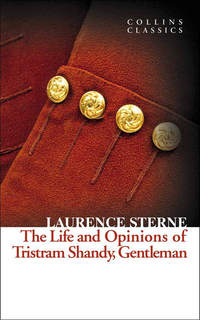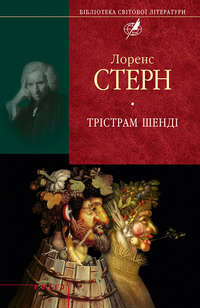
Полная версия
Tristram Shandy

THE LIFE AND OPINIONS OF TRISTRAM SHANDY, GENTLEMAN
Laurence Sterne

CONTENTS
Title Page
History of Collins
Life & Times
To the Right Honourable Mr. Pitt.
Volume I
Chapter One
Chapter Two
Chapter Three
Chapter Four
Chapter Five
Chapter Six
Chapter Seven
Chapter Eight
Chapter Nine
Chapter Ten
Chapter Eleven
Chapter Twelve
Chapter Thirteen
Chapter Fourteen
Chapter Fifteen
Chapter Sixteen
Chapter Seventeen
Chapter Eighteen
Chapter Nineteen
Chapter Twenty
Chapter Twenty-one
Chapter Twenty-two
Chapter Twenty-three
Chapter Twenty-four
Chapter Twenty-five
Volume II
Chapter One
Chapter Two
Chapter Three
Chapter Four
Chapter Five
Chapter Six
Chapter Seven
Chapter Eight
Chapter Nine
Chapter Ten
Chapter Eleven
Chapter Twelve
Chapter Thirteen
Chapter Fourteen
Chapter Fifteen
Chapter Sixteen
Chapter Seventeen
Chapter Eighteen
Chapter Nineteen
Volume III
Chapter One
Chapter Two
Chapter Three
Chapter Four
Chapter Five
Chapter Six
Chapter Seven
Chapter Eight
Chapter Nine
Chapter Ten
Chapter Eleven
Chapter Twelve
Chapter Thirteen
Chapter Fourteen
Chapter Fifteen
Chapter Sixteen
Chapter Seventeen
Chapter Eighteen
Chapter Nineteen
Chapter Twenty
Chapter Twenty-one
Chapter Twenty-two
Chapter Twenty-three
Chapter Twenty-four
Chapter Twenty-five
Chapter Twenty-six
Chapter Twenty-seven
Chapter Twenty-eight
Chapter Twenty-nine
Chapter Thirty
Chapter Thirty-one
Chapter Thirty-two
Chapter Thirty-three
Chapter Thirty-four
Chapter Thirty-five
Chapter Thirty-six
Chapter Thirty-seven
Chapter Thirty-eight
Chapter Thirty-nine
Chapter Forty
Chapter Forty-one
Chapter Forty-two
Chapter Forty-three
Volume IV
Slawkenbergii Fabella
Slawkenbergius’s Tale
Chapter One
Chapter Two
Chapter Three
Chapter Four
Chapter Five
Chapter Six
Chapter Seven
Chapter Eight
Chapter Nine
Chapter Ten
Chapter Eleven
Chapter Twelve
Chapter Thirteen
Chapter Fourteen
Chapter Fifteen
Chapter Sixteen
Chapter Seventeen
Chapter Eighteen
Chapter Nineteen
Chapter Twenty
Chapter Twenty-one
Chapter Twenty-two
Chapter Twenty-three
Chapter Twenty-four
Chapter Twenty-five
Chapter Twenty-six
Chapter Twenty-seven
Chapter Twenty-eight
Chapter Twenty-nine
Chapter Thirty
Chapter Thirty-one
Volume V
Chapter One
Chapter Two
Chapter Three
Chapter Four
Chapter Five
Chapter Six
Chapter Seven
Chapter Eight
Chapter Nine
Chapter Ten
Chapter Eleven
Chapter Twelve
Chapter Thirteen
Chapter Fourteen
Chapter Fifteen
Chapter Sixteen
Chapter Seventeen
Chapter Eighteen
Chapter Nineteen
Chapter Twenty
Chapter Twenty-one
Chapter Twenty-two
Chapter Twenty-three
Chapter Twenty-four
Chapter Twenty-five
Chapter Twenty-six
Chapter Twenty-seven
Chapter Twenty-eight
Chapter Twenty-nine
Chapter Thirty
Chapter Thirty-one
Chapter Thirty-two
Chapter Thirty-three
Chapter Thirty-four
Chapter Thirty-five
Chapter Thirty-six
Chapter Thirty-seven
Chapter Thirty-eight
Chapter Thirty-nine
Chapter Forty
Chapter Forty-one
Chapter Forty-two
Chapter Forty-three
Volume VI
Chapter One
Chapter Two
Chapter Three
Chapter Four
Chapter Five
Chapter Six
Chapter Seven
Chapter Eight
Chapter Nine
Chapter Ten
Chapter Eleven
Chapter Twelve
Chapter Thirteen
Chapter Fourteen
Chapter Fifteen
Chapter Sixteen
Chapter Seventeen
Chapter Eighteen
Chapter Nineteen
Chapter Twenty
Chapter Twenty-one
Chapter Twenty-two
Chapter Twenty-three
Chapter Twenty-four
Chapter Twenty-five
Chapter Twenty-six
Chapter Twenty-seven
Chapter Twenty-eight
Chapter Twenty-nine
Chapter Thirty
Chapter Thirty-one
Chapter Thirty-two
Chapter Thirty-three
Chapter Thirty-four
Chapter Thirty-five
Chapter Thirty-six
Chapter Thirty-seven
Chapter Thirty-eight
Chapter Thirty-nine
Chapter Forty
Volume VII
Chapter One
Chapter Two
Chapter Three
Chapter Four
Chapter Five
Chapter Six
Chapter Seven
Chapter Eight
Chapter Nine
Chapter Ten
Chapter Eleven
Chapter Twelve
Chapter Thirteen
Chapter Fourteen
Chapter Fifteen
Chapter Sixteen
Chapter Seventeen
Chapter Eighteen
Chapter Nineteen
Chapter Twenty
Chapter Twenty-one
Chapter Twenty-two
Chapter Twenty-three
Chapter Twenty-four
Chapter Twenty-five
Chapter Twenty-six
Chapter Twenty-seven
Chapter Twenty-eight
Chapter Twenty-nine
Chapter Thirty
Chapter Thirty-one
Chapter Thirty-two
Chapter Thirty-three
Chapter Thirty-four
Chapter Thirty-five
Chapter Thirty-six
Chapter Thirty-seven
Chapter Thirty-eight
Chapter Thirty-nine
Chapter Forty
Chapter Forty-one
Chapter Forty-two
Chapter Forty-three
Volume VIII
Chapter One
Chapter Two
Chapter Three
Chapter Four
Chapter Five
Chapter Six
Chapter Seven
Chapter Eight
Chapter Nine
Chapter Ten
Chapter Eleven
Chapter Twelve
Chapter Thirteen
Chapter Fourteen
Chapter Fifteen
Chapter Sixteen
Chapter Seventeen
Chapter Eighteen
Chapter Nineteen
Chapter Twenty
Chapter Twenty-one
Chapter Twenty-two
Chapter Twenty-three
Chapter Twenty-four
Chapter Twenty-five
Chapter Twenty-six
Chapter Twenty-seven
Chapter Twenty-eight
Chapter Twenty-nine
Chapter Thirty
Chapter Thirty-one
Chapter Thirty-two
Chapter Thirty-three
Chapter Thirty-four
Chapter Thirty-five
Volume IX
Chapter One
Chapter Two
Chapter Three
Chapter Four
Chapter Five
Chapter Six
Chapter Seven
Chapter Eight
Chapter Nine
Chapter Ten
Chapter Eleven
Chapter Twelve
Chapter Thirteen
Chapter Fourteen
Chapter Fifteen
Chapter Sixteen
Chapter Seventeen
Chapter Eighteen
Chapter Nineteen
Chapter Twenty
Chapter Twenty-one
Chapter Twenty-two
Chapter Twenty-three
Chapter Twenty-four
Chapter Twenty-five
Chapter Twenty-six
Chapter Twenty-seven
Chapter Twenty-eight
Chapter Twenty-nine
Chapter Thirty
Chapter Thirty-one
Chapter Thirty-two
Chapter Thirty-three
Classic Literature: Words and Phrases adapted from the Collins English Dictionary
Copyright
About the Publisher
History of Collins
In 1819, millworker William Collins from Glasgow, Scotland, set up a company for printing and publishing pamphlets, sermons, hymn books and prayer books. That company was Collins and was to mark the birth of HarperCollins Publishers as we know it today. The long tradition of Collins dictionary publishing can be traced back to the first dictionary William published in 1824, Greek and English Lexicon. Indeed, from 1840 onwards, he began to produce illustrated dictionaries and even obtained a licence to print and publish the Bible.
Soon after, William published the first Collins novel, Ready Reckoner, however it was the time of the Long Depression, where harvests were poor, prices were high, potato crops had failed and violence was erupting in Europe. As a result, many factories across the country were forced to close down and William chose to retire in 1846, partly due to the hardships he was facing.
Aged 30, William’s son, William II took over the business. A keen humanitarian with a warm heart and a generous spirit, William II was truly ‘Victorian’ in his outlook. He introduced new, up-to-date steam presses and published affordable editions of Shakespeare’s works and Pilgrim’s Progress, making them available to the masses for the first time. A new demand for educational books meant that success came with the publication of travel books, scientific books, encyclopaedias and dictionaries. This demand to be educated led to the later publication of atlases and Collins also held the monopoly on scripture writing at the time.
In the 1860s Collins began to expand and diversify and the idea of ‘books for the millions’ was developed. Affordable editions of classical literature were published and in 1903 Collins introduced 10 titles in their Collins Handy Illustrated Pocket Novels. These proved so popular that a few years later this had increased to an output of 50 volumes, selling nearly half a million in their year of publication. In the same year, The Everyman’s Library was also instituted, with the idea of publishing an affordable library of the most important classical works, biographies, religious and philosophical treatments, plays, poems, travel and adventure. This series eclipsed all competition at the time and the introduction of paperback books in the 1950s helped to open that market and marked a high point in the industry.
HarperCollins is and has always been a champion of the classics and the current Collins Classics series follows in this tradition – publishing classical literature that is affordable and available to all. Beautifully packaged, highly collectible and intended to be reread and enjoyed at every opportunity.
Life & Times
Publication and Readership
Tristram Shandy is one of a group of books that could be described as part of the infancy of the novel. It dates from 1759, 40 years after Daniel Defoe’s Robinson Crusoe and 10 years after Henry Fielding’s Tom Jones. All three have eponymous male heroes, as was the trend at that time.
Tristram Shandy was originally published in nine volumes under the title The Life and Opinions of Tristram Shandy, Gentleman. Those nine installments spanned an eight-year period, from 1759–67. The author was Laurence Sterne (1713–68), an Irish-born clergyman who was an admirer of the French Renaissance writer François Rabelais, whom he wished to emulate in his comic prose. Rabelais’ work found humour in the reality of human nature – sex, vulgarity, swearing, violence, insults, stupidity and so on. Sterne made this style his genre, but his subject matter was quite different.
Sterne was well into middle age when the first volume of Tristram Shandy was published and he died just a couple of years after the last volume. It seems that his primary motivation was to make the most of his writing ability before it was too late, as he saw himself as Rabelais’ literary successor.
In England, Sterne’s work was not considered in a serious light in literary terms, because it was bawdy and crude. The English author Samuel Johnson thought of Tristram Shandy as rather too odd to have any lasting status. When one considers that it was published in the considerable shadow of Gulliver’s Travels (1726), by fellow Irishman Jonathan Swift, it is perhaps understandable that Sterne’s work was seen as eccentric and unambitious. It was certainly not a romantic adventure story, which is what people had come to expect of the novel.
Interestingly, book publishing was already subject to piracy in the late 1700s, so Sterne addressed the matter by signing the title pages of his books in order to authenticate them. He had to do this in excess of 12,000 times in an attempt to ensure that he received his royalty earnings. Although Sterne had his detractors in high literary circles, Tristram Shandy became popular very quickly across Europe, making him famous for the few remaining years of his life.
Tristram Shandy, Gentleman
The running joke in Tristram Shandy is the verbosity of the narrator, who finds it difficult to get to the point, always digressing and embellishing the story. This comic intention had a polarizing effect on Sterne’s 19th-century readership. After all, a personality trait that is amusing to one person might very easily be extremely irritating to another.
An added complication comes when the reader does not necessarily understand that humour is the aim of the author. Bearing in mind that people would have been unfamiliar with the concept of the comic novel in general, Sterne had his work cut out, especially given that his particular genre of comedy was somewhat coarse and dark for the tastes of his era.
One of the most notable personalities in the book is that of the character Uncle Toby. He is particularly fond of regaling stories of a military nature by verbally and physically acting them out, much to the amusement of others. The narrating voice of Tristram describes these tales as his uncle’s ‘hobbyhorse’, which is a term he uses in general to describe the way different characters find their amusement in life.
The original frontispiece etching for Tristram Shandy, by William Hogarth, shows a character named Corporal Trim reading a sermon on the subject of conscience to a rather disinterested audience, preoccupied with smoking pipes and sleeping. In the foreground is a rotund figure ensconced in an armchair. He wears an 18th-century wig and attire, his tricorn hat fallen to the floor. This image is attributed as the model for the Toby Jug that Staffordshire potters began manufacturing in the 1760s. Although mistaken for Uncle Toby, the image is in fact of Dr Slop, while Uncle Toby actually sits with the narrator’s father Walter in the far corner of the room. Hogarth also illustrated Tristram’s baptism, following his birth, which doesn’t come until volume four of the book, such is the narrator’s tendency for logorrhea.
One of the most remarkable things about Sterne’s approach to writing is the way in which he used graphics to relay information to the reader. For example, there was an entirely black page following the demise of a character named Yorick, which acts as a psychological pause for thought and contemplation. He also uses entirely blank pages to encourage the reader to superimpose their own imagined visual image of the characters. There is also the use of peculiar punctuation, dashes and lines, which Sterne uses as expressive semiotic tools in his prose where he feels that words alone are insufficient. All in all, the effect is rather eccentric and disjointed. However, a century later this odd style would be exalted as the seminal avant-garde literary form.
About the Author
Sterne was the son of an English army officer and spent his early years moving wherever his father was stationed. At the age of 10, he was sent to school in Halifax, where he was introduced to Latin and Greek. In turn, he was able to read the Classics and so had a formal education in seminal literature, such as the works of Homer, which profoundly affected his sensibilities. He later studied at Cambridge for his first and second degrees.
Like many gentlemen academics of his era, Sterne was encouraged to enter the church and was ordained as a vicar at the age of 25. Life as a clergyman did not really suit Sterne’s temperament, and he also suffered from tuberculosis or consumption, which made his voice rather too weak for preaching to a congregation. Despite these drawbacks, he persisted with his ‘calling’.
He married at the age of 28 and became father to a daughter, Lydia, some six years later. A decade later, his wife, Elizabeth, suffered a breakdown when she learned that Sterne had had an affair with a maid. In addition, his health was failing and Lydia was a sickly child, so the household became rather unhappy.
It was at this time that Sterne turned to his pen, probably as much as a form as escapism as an attempt to fulfill a long-held literary ambition. He had met many colourful characters in his life and he possessed a keen intellect for satire, irony, cynicism, scepticism and rhetoric. This enabled him to populate Tristram Shandy with a cast of exaggerated personalities in a similar vein to Charles Dickens, who was born a century later.
Sterne finally succumbed to the tuberculosis infection that had dogged him his entire adult life. It is not entirely clear that he had finished Tristram Shandy, for he may well have added subsequent volumes had he lived on, and the format was certainly open-ended. Following his death, he did provide one more darkly comic installment: his body was exhumed by grave robbers and sold in Cambridge for an anatomy lecture, which was quite commonplace at the time. As he was a prominent figure, someone recognized his cadaver in the operating room and he was discreetly returned to his resting place. Sterne would surely have found this event rather amusing from his celestial vantage point, for it was just the kind of thing that he borrowed from in his work.

To the Right Honourable Mr. Pitt.
Sir,
Never poor Wight of a Dedicator had less hopes from his Dedication, than I have from this of mine; for it is written in a bye corner of the kingdom, and in a retir’d thatch’d house, where I live in a constant endeavour to fence against the infirmities of ill health, and other evils of life, by mirth; being firmly persuaded that every time a man smiles,—but much more so, when he laughs, it adds something to this Fragment of Life.
I humbly beg, Sir, that you will honour this book, by taking it—(not under your Protection,—it must protect itself, but)—into the country with you; where, if I am ever told, it has made you smile; or can conceive it has beguiled you of one moment’s pain—I shall think myself as happy as a minister of state;—perhaps much happier than any one (one only excepted) that I have read or heard of.
I am, Great Sir, (and, what is more to your Honour) I am, Good Sir, Your Well-wisher, and most humble Fellow-subject,
The Author.
Chapter One
I wish either my father or my mother, or indeed both of them, as they were in duty both equally bound to it, had minded what they were about when they begot me; had they duly consider’d how much depended upon what they were then doing;—that not only the production of a rational Being was concerned in it, but that possibly the happy formation and temperature of his body, perhaps his genius and the very cast of his mind;—and, for aught they knew to the contrary, even the fortunes of his whole house might take their turn from the humours and dispositions which were then uppermost;—Had they duly weighed and considered all this, and proceeded accordingly,—I am verily persuaded I should have made a quite different figure in the world, from that in which the reader is likely to see me.—Believe me, good folks, this is not so inconsiderable a thing as many of you may think it;—you have all, I dare say, heard of the animal spirits, as how they are transfused from father to son, &c. &c.—and a great deal to that purpose:—Well, you may take my word, that nine parts in ten of a man’s sense or his nonsense, his successes and miscarriages in this world depend upon their motions and activity, and the different tracks and trains you put them into, so that when they are once set a-going, whether right or wrong, ’tis not a half-penny matter,—away they go cluttering like hey-go mad; and by treading the same steps over and over again, they presently make a road of it, as plain and as smooth as a garden-walk, which, when they are once used to, the Devil himself sometimes shall not be able to drive them off it.








